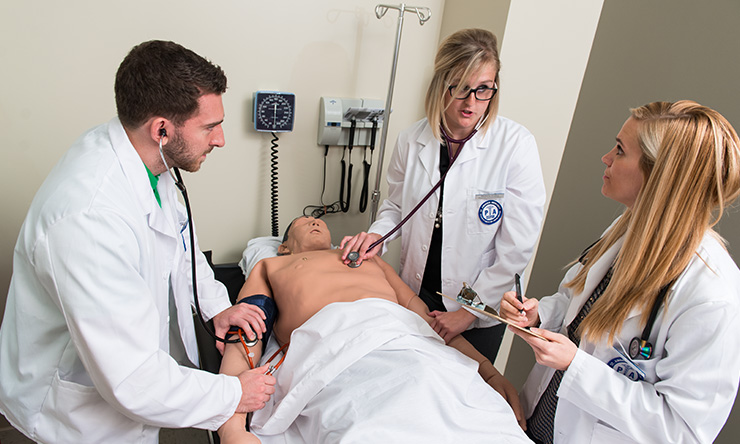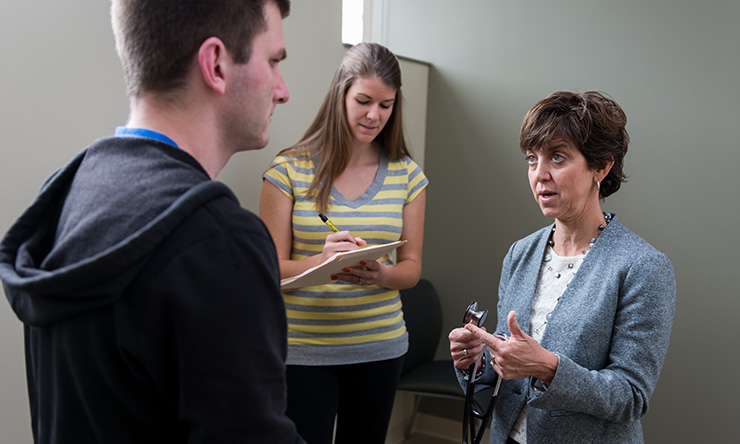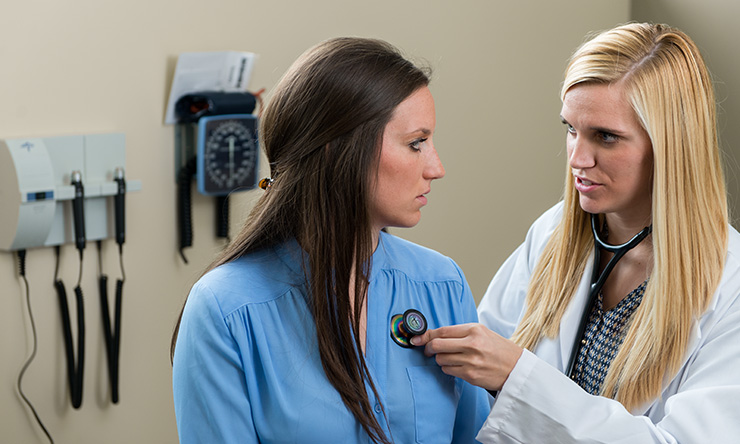Whether you want to provide primary care to residents in rural America or work in hospitals in underserved communities, St. Ambrose has a program to help you achieve – and exceed – all of your goals.
Our graduates work in family practice, internal medicine, pediatrics, OB/GYN, and other sectors within rural and underserved populations.
Ambrose Advantages
- Only MPAS Program In QC and Western Illinois Region
- We Invest In Your Success



At SAU, we prepare highly qualified and compassionate Physician Assistants by providing deep learning opportunities in the classroom and in communities. You will work side-by-side with experts and specialists in medical communities, and just as closely with program faculty and mentors.
Your Career as a Physician Assistant
Our 2016 MPAS graduates were tremendously successful in finding employment, and many received multiple offers prior to graduation.
More Information on the Master of Physician Assistant Studies Program
You will be trained in the medical model to provide patient care, including physical examinations, ordering tests, diagnosing and treating illness, performing minor procedures, as well as first-assisting in surgery.
Our 29-month program is comprised of 124 credit hours. We accept a new class of 30 students annually through a competitive application process and coursework begins in the summer.
The first 14 months of the program are didactic. Classroom and laboratory studies include anatomy, pathology, physical examination and clinical medicine. This phase consists of twelve (12) 4-week long clinical rotations in Family Practice (8 weeks), Pediatrics, Women’s Health, Surgery, Emergency Medicine, Internal medicine, and Behavioral Health in addition to 4 elective rotations. Students also return to campus during this phase for testing and educational activities. Prospective and enrolled students are not required to provide or solicit clinical sites or preceptors. Students may provide suggestions. All sites and preceptors will be evaluated to ensure the site offers the instructional objectives and learning outcomes required for each clinical rotation. Clinical rotations are primarily found within the Midwest. Students may be required to find and pay for additional housing at up to two clinical rotations.
Graduates will be eligible to seek initial licensure in all 50 states once they have graduated from SAU's accredited PA program and passed the NCCPA exam (PANCE). In some cases, jurisdictions may require current NCCPA certification, as well as other documentation or fees when applying. For more information about such licensure application requirements, please visit the respective state licensing websites.
- Based on projected needs in rural states, primary care is an emphasis of our program. The Association of American Medical Colleges (AAMC) reports the demand for physician services is increasing rapidly while the nation's population continues to age, grow, live longer, and has more chronic illnesses. Physician assistants are part of the solution to help alleviate shortages.
- We have a strong history and regional reputation for training high-quality, caring health professionals. Each year, more than 500 students enroll in SAU accredited health sciences programs in nursing, physical therapy, occupational therapy, speech-language pathology, and social work. In fact, the St. Ambrose University College of Health and Human Services houses two of the top doctoral programs in the country: Physical Therapy and Occupational Therapy.
- Studying at SAU for your Physician Assistant degree means you graduate prepared to practice. More than 90% of students who took the Physician Assistant National Certifying Exam (PANCE) passed on their first try.
The U.S. Bureau of Labor Statistics projection of a 37 percent increase in PA positions through 2030. The median annual wage for a physician assistant in 2020 was $115,390 (Bureau of Labor Statistics).
And students from St. Ambrose University are no exception. Our MPAS graduates are tremendously successful in securing employment (see Program Goals below), and many receive multiple offers prior to graduation.
More than half of our alumni work in underserved or rural areas delivering primary care. Graduates are practicing in 20 different states in 25 different specialities.
Madeline Schroeder '16 MPAS was recognized in 2019 with the Emerging Leader Alumna Award for her deep dedication to service.
When you enroll in a graduate program, you are making a personal, professional, and financial investment. The cost may seem daunting, but there are programs that can help.
MPAS students are part of the One Price Plan that ensures tuition costs remain at one rate throughout the normal course of full-time graduate study. Additionally, the cost is consistent across semesters, making financial planning easier.
The One Price tuition is $13,705/semester for new students entering during the 2023-24 academic year. There are some additional costs for textbooks and technology. We estimate your total tuition for the program to be $109,640.
Loan Repayment Programs
Due to a nationwide shortage of physician assistants, there are several loan repayment programs that offer partial or full repayment of college loans. The American Association of Medical Colleges provides a database to search loan repayment/forgiveness and scholarship programs.
Specifically in Iowa, the Primary Care Recruitment and Retention Endeavor offers two-year grants when PAs work in a health professional shortage area. MPAS students may be eligible for low-interest federal student loans. Our Financial Aid Office can provide you with more information.
Mission and Goals
Mission
The mission of the St. Ambrose University Physician Assistant Program is to prepare physician assistants to deliver high-quality patient-centered care with compassion and respect.
The program provides a supportive environment to assist students as they develop into professionals with the knowledge and skills to contribute to the health and welfare of their communities.
1. Maintain an accredited MPAS program.
2. Maintain a level of PANCE pass rate above the national average.
3. Meet the primary care work force needs.
4. Demonstrate the highest standards of student professionalism.
5. Work effectively with other members of the health care team.
6. Demonstrates service or assume leadership roles within the profession and the community.
7. Recruit and retain qualified student applicants.
Outline of SAU PA Program Effectiveness in Meeting Program Goals
St. Ambrose University PA Program Competencies:
The student's acquisition of medical knowledge and skills in the program will be based on the biopsychosocial model of care. This model requires knowledge and analysis of the biological, psychological, and social aspects of health and illness and the scientific and compassionate application to human structure, function, and behavior. It also requires knowledge of the contextual and underlying factors including current medical practice concepts, clinical research in medicine and its application to clinical decision making, medical delivery and payment systems, effective utilization of communication, the values and ethics of professionalism, and self-assessment activities for continuous self-improvement and improvement of patient care. This model of care is consistent with the mission and goals of the program.
The SAU PA Program's education goals are to develop physician assistants who have the necessary knowledge and skill set to competently practice medicine. The program provides the training to meet the stated competencies. To ensure the program has accomplished these goals, students will undergo a summative evaluation in the last few months prior to graduation to confirm they have met the following competencies in the following 5 domains:
1. Medical Knowledge
a. Apply a broad-based medical knowledge across organ systems and medical settings.
b. Integrate medical knowledge with clinical reasoning skills to provide preventative care.
c. Integrate medical knowledge and clinical findings to diagnose acute and chronic diseases.
2. Clinical and Technical Skills
a. Perform procedural and clinical skills considered essential for entry into PA practice.
b. Conduct a pertinent patient-centered focused history.
c. Perform a pertinent physical examination.
d. Effectively counsel and educate a patient using shared-decision making.
3. Clinical Reasoning and Problem-Solving Abilities
a. Synthesize information acquired through all aspects of patient encounters to formulate a differential diagnosis for acute and chronic health conditions.
b. Be proficient in ordering and interpreting appropriate laboratory tests and diagnostic studies.
c. Develop an appropriate patient-centered clinical therapeutic plan.
4. Interpersonal Skills
a. Communicate effectively with patients, families or other health care professionals.
b. Demonstrate the ability to write appropriate medical documentation.
c. Develop rapport and demonstration compassion and respect for patients and families.
5. Professional Behaviors
a. Demonstrate understanding of ethical and legal principles in healthcare.
b. Demonstrate compassion, respect, and awareness of all, including diverse patient populations or healthcare disparities.
c. Identify and perform learning activities that address one's gaps in knowledge, skills, or attitudes.
d. Demonstrate respect in interactions with peers, teachers, staff, other healthcare team members.
Requirements and Policies
Prerequisite Coursework is listed on the Admission and Application page
The Master of Physician Assistant Studies Program (MPAS) is 29 months in length consisting of a 14-month didactic component followed by 15-month supervised clinical clerkship component. The didactic phase is comprised of classroom instruction in advanced basic sciences, clinical skills, clinical medicine, pharmacology, behavioral medicine, ethics, and research.
In general, classes are held Monday-Friday, 8 a.m. – 5 p.m. Students are expected to attend all classes and should have no other commitments during these hours.
The clinical phase of the program consists of 15 months of supervised clinical clerkships. This phase consists of twelve (12) 4-week long clinical rotations in Family Practice (8 weeks), Pediatrics, Women’s Health, Surgery, Emergency Medicine, Internal medicine, and Behavioral Health in addition to 4 elective rotations.
Some rotations will require students to work on the weekends and evenings. Students are required to be available as instructed by their preceptors. At various times throughout the clinical phase, students will return to campus for end-of-rotation educational sessions. A separate handbook will be distributed during the clinical year orientation detailing specifics for the clinical year.
Note: We do not allow for advanced standing, regardless of previous graduate work in healthcare. All incoming students must complete the entire PA curriculum.
View Master of Physician Assistant Studies courses and descriptions in the online course catalog
Year 1: Summer (8 weeks)
MPAS 550 Gross Anatomy, 5 credits
Year 1: Fall (17 credits)
MPAS 510 Advanced Physiology, 5 credit
MPAS 520 Medical Pathology, 5 credits
MPAS 530 Clinical Laboratory Science, 2 credits
MPAS 600 Professional Practice Issues, 1 credits
MPAS 620 Communication in Medicine I, 2 credits
MPAS 630 Healthcare Systems, 2 credits
Year 1: Spring (20 credits)
MPAS 640 Medicine I, 9 credits
MPAS 650 Pharmacotherapy I, 4 credits
MPAS 660 Clinical Skills I, 3 credits
MPAS 625 Communication in Medicine II, 1 credits
MPAS 680 Behavioral Medicine, 3 credits
Year 2: Summer (20 credits)
MPAS 645 Medicine II, 11 credits
MPAS 655 Pharmacotherapy II, 4 credits
MPAS 665 Clinical Skills II, 1 credit
MPAS 672 Evidence Based Medicine 2 credits
MPAS 690 Medical Ethics, 2 credits
Year 2: Fall (14 credits)
MPAS 677 Research Application, 2 credits
MPAS 700 Clinical Preparation, 4 credits
MPAS 700s (2) Clinical Preceptorships, 8 credits
Year 2: Spring (17 credits)
MPAS 700s (4) Clinical Preceptorships, 16 credits
MPAS 712 Clinical End of Rotation Block, 1 credit
Year 3: Summer (14 credits)
MPAS 700s (3) Clinical Preceptorships, 12 credit hours
MPAS 712A, 712B Clinical End of Rotation Block, 2 credits
Year 3: Fall (17 credits)
MPAS 700s (3) Clinical Preceptorships, 12 credits
MPAS 712 Clinical End of Rotation Block, 1 credit
MPAS 715 Summative Evaluation, 4 credits
Total credit hours: 124
Our Department
Suzanne Peppers, MMS, PA-C, Director and Assistant Professor
David Rohlf, MD, Medical Director
Mary Jo Bloominger, MPAS, PA-C, Assistant Professor
Jenny Ferrell, Administrative Assistant
Angie King, Program Coordinator
Tammy Moran, MS-PAS, PA-C, Lecturer
Janelle Pillard, MSPA, PA-C, Assistant Professor
Angela Schmieder, MMS, PA-C, Director of Clinical Education
Adam Spiegel, Clinical Placement Coordinator
Janelle Stieger, Clinical Compliance Coordinator
Ready to Apply?
Take the next step to earning your degree and apply to the Master of Physician Assistant Studies program.
MPAS students from the Class of 2021 achieved a 100 percent first-time pass rate on the NCCPA exam, an accomplishment that speaks to the strength of the program, dedication of faculty, and the deep drive of our students to achieve their goals.
Korbyn Granado-Bolton
Master of Physician Assistant Studies,Neurosurgery PA-C, MercyOne Medical Center, Des Moines, Iowa,Class of 2019
Korbyn and her classmates learned an amazing amount of medicine in 29 months, and the strength of our MPAS program was clearly evident: every member of the 2019 cohort passed the NCCPA exam. Korbyn was offered a job in Neurosurgery at MercyOne Medical Center in Des Moines, Iowa, two months before graduating.
Contact
Angie King
Master of Physician Assistant Studies
Center for Health Sciences Education #287
518 W. Locust St.
Davenport, IA 52804
563-333-5886
PA@sau.edu
